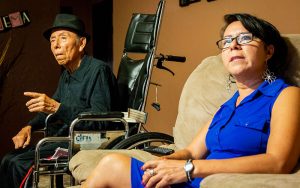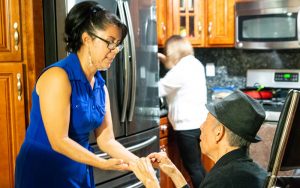- Slug: BC-CNS-Alzheimer’s Minorities. 955 words.
- 2 photos and caption below.
- Graphic here.
By BRIANNA BRADLEY
Cronkite News
LAVEEN – It’s nearing 7 p.m., into the evening hours of a long day of caregiving for the daughters of Santiago González – a life that has become routine in the decade since their father was diagnosed with Alzheimer’s disease.
Maury González asks her father if he’s ready for dinner. She spoon-feeds him applesauce while sitting beside her mother, Juanita, and plays ranchera music on her phone to entertain him with the soothing sounds of Las Jilguerillas, a female band. Her father, 78, stares at the screen as he clenches his daughter’s hand.
Thirty minutes later, another daughter, Aracely Villegas, who owns the home with her husband, arrives after a long day at work. It soon will be her turn to help for a few hours.
The family network of care for Santiago González has become, over the years, as familiar as the lyrics of his favorite music. The family is like those of many of more than millions diagnosed in the U.S. with Alzheimer’s. But González’s story is complicated by other matters.
According to a 2018 Alzheimer’s Association report, some studies show older African-Americans are twice as likely to be diagnosed with Alzheimer’s and older Hispanics are 1.5 times more likely to be diagnosed with the brain disease than older whites who are not Hispanic.
And members of ethnic or racial minorities often have cultural barriers that impede treatment, such as a lack of information, fear of seeking services and a general distrust of the health system, according to experts at the Banner Alzheimer’s Institute.
“Minorities are the most affected,” said Dr. Ganesh Gopalakrishna, a dementia specialist at the institute. “It is crucial that we inform minority populations.”
Latinos who are U.S. immigrants may face other obstacles. González has legal hurdles that prevented him from receiving state-paid health care for several years, even as he faces other health problems, such as diabetes and schizophrenia.
A man of strength and character
“Before his diagnosis, my father was a very strong person, a very strict father with strong character,” Maury González recalled.
Maury, 47, said it has been sad to remember how he was before the diagnosis and to see his memory slip away little by little. Alzheimer’s is a type of dementia that causes problems with memory and cognitive abilities mainly in adults 65 and older.
Five years ago, Santiago and Juanita González moved to Phoenix from Durango, Mexico, in search of better health-care services. But the transition has not been easy. After the move, the couple learned that as an immigrant, Santiago would not be able to receive health insurance under Medicare until he had been a permanent legal resident for five years. That’s a requirement of the Arizona Health Care Cost Containment System, known as AHCCCS, which administers Medicare in Arizona.
As they wait for the eligibility status that will come in January, Santiago lives in Laveen with Juanita, daughter Aracely Villegas, her husband and five grandchildren. Maury comes to the house during the day to care for him. Five other children live in Mexico and help financially.
“We take turns caring for him,” Maury said of her sister. “I go during the mornings to help get him out of bed and to get him dressed.”
During the nights, Aracely helps their father and their mother helps both sisters whenever she is needed.
Maury said that her family didn’t think Alzheimer’s would affect their father as quickly as it did. After his diagnosis, they didn’t known much about the disease or how to care for him. They did not seek medical care or assistance at first for fear that it would be too expensive without reliable insurance.
“It has been difficult for us,” Maury said. “One of the side effects of Alzheimer’s is that he talks loudly at night and does not sleep.”
After at least a year of struggling with caregiving, Maury met Graciela Mera, a family-care consultant with the Desert Southwest Chapter of the Alzheimer’s Association who reaches out to Latino families in Arizona. Mera taught the González family how to better care for their father in such everyday tasks as getting out of bed and getting dressed in the morning.
Mera counseled them on ways to deal with Santiago’s specific case of Alzheimer’s, how to better understand the disease and how to better care for him through it.
“It creates stress not knowing how to communicate with someone with dementia,” Mera said.
The hardest part for families, she said, is coming to terms with the fact that their loved one no longer recognizes them nor remembers their name.
Santiago recognizes his daughters’ faces but can’t remember their names. He uses a wheelchair and needs assistance with eating, bathing, using the bathroom and getting out of bed.
Ethnic, racial minorities at risk
Gopalakrishna, the dementia specialist at Banner, said recent studies indicate the diagnosis of dementia for Hispanics and African-Americans is higher than for non-Hispanic whites.
There’s no one single way to explain the prevalence of this disease among people of color, Gopalakrishna said. Yet, there are certain risk factors for dementia that are present in those communities, specifically cardiovascular problems like diabetes and hypertension, he said.
Education can help prevent cognitive problems later in life, Gopalakrishna said, which means the educational inequities prevalent in minority communities often puts them at a disadvantage.
By 2060, the number of people 65 or older with dementia is expected to double, disproportionately affecting racial and ethnic minorities.
Over the next seven years, the diagnosis of Alzheimer’s cases is expected to grow by 43 percent in Arizona, placing the state second in the U.S. for Alzheimer’s growth rates, behind Alaska.
Reporter Yattsi Medina contributed to this report.
Follow us on Twitter.
For more stories from Cronkite News, visit cronkitenews.azpbs.org.
^_=

